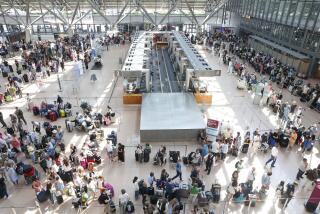Germany’s Busiest Airport Grounded by Strike : Labor: The 24-hour protest at Frankfurt represents the most crippling blow of the public services dispute.
- Share via
FRANKFURT, Germany — Striking public workers brought mainland Europe’s busiest airport to a standstill Tuesday in the most crippling blow yet of the worst labor dispute ever in postwar Germany.
The 24-hour protest at Frankfurt International Airport affected some 900 flights and more than 10,000 passengers, costing airlines and airport concessions millions of dollars in lost business after baggage handlers, security staff and firefighters walked off the job.
“We’ll be spending the night here,” said Jean Marsden, her broken foot propped up on a suitcase in the nearly deserted terminal. Marsden was stranded along with five other relatives who had traveled to Germany for a wedding and were awaiting a flight home to England.
“We have no money left for hotels,” Marsden explained, working her umpteenth crossword puzzle of the day.
Next to her, Claire Forrester, 9, fought tears of boredom, frustration and exhaustion after 11 straight hours of waiting.
“We’ll pretend we’re in the Blitz (the World War II aerial bombardment of London),” Marsden said cheerily.
Thousands of passengers were bused to airports in France, Belgium and Holland or told to simply wait until midnight to see if the state of Hessen would permit late takeoffs as soon as the strike ended.
Negotiations are scheduled to resume today between the 2-million-member union and the center-right government of Chancellor Helmut Kohl, which has spurned workers’ demands for a 9.5% pay increase, instead offering 4.8%. The union previously agreed to a mediator’s compromise of 5.4%; the government rejected that, citing the skyrocketing costs of German unification.
“The strike will continue until we have an acceptable result,” said union leader Monika Wulf-Mathies.
Other airports across Germany also have been hit by the strikes, which began April 27.
Public transportation, garbage collection, mail delivery, train service and gravedigging have also been sporadically affected by the labor unrest, which appears to have pitched Kohl’s government into an economic quagmire.
The opposition Social Democrats used the unrest and recent Cabinet shuffles as a reason on Tuesday to call for new elections, which now are not scheduled until 1994.
Also Tuesday, Finance Minister Theo Waigel outlined new budget figures before the Bundestag, or lower house of Parliament, and said that cuts in public spending were needed to grapple with a budget deficit projected at $27.4 billion this year.
“This is Kohl’s fault!” grumbled a man standing in line with his wife and two children for a canceled flight to Turkey, where they planned to vacation.
A friend standing behind him agreed.
“It’s a good strike, even if it does affect us personally,” said Gerhard Hinsberger, 42, a security consultant from Wiesbaden.
“I had a chat with my mailman yesterday, and he’s earning only 2,400 marks a month ($1,454). That’s little more than pocket change. Since unification, everything’s more expensive. You go to buy a roll at the bakery and it costs 10 cents more than it used to. Rents are higher. How are you supposed to afford it?”
Some 275,000 public workers so far have participated in the strikes, which so far seem to have triggered more public annoyance than outright anger.
“I’d rather be stuck here at the airport than at home,” joked businessman Guenther Rapp. “The uncollected garbage in our courtyard is overflowing and it stinks.”
Rapp said workers’ demands “are not so crazy” but admitted that he was “a bit irritated.” Rapp then joined several dozen other passengers being shepherded to a waiting bus for the 90-minute drive to Strasbourg, where they would catch a plane to their final destination: Lisbon.
Ticket clerks said that passengers for the most part were polite and patient and that chaos was avoided because the union had given 24 hours’ warning before the strike. The normally bustling airport looked like a ghost town Tuesday.
Sylvia Lerche, 22, sat reading a magazine at the cash register of her candy stand.
“I was working at the delicatessen in another part of the airport this morning, but they closed down after a couple of hours because it was in a passengers-only area and there were no passengers,” she said.
“That deli usually takes in 20,000 to 30,000 marks ($12,000 to $18,000) a day,” she added. “All the Japanese travelers go there to buy caviar and expensive sausages to take home.”
More to Read
Sign up for Essential California
The most important California stories and recommendations in your inbox every morning.
You may occasionally receive promotional content from the Los Angeles Times.













